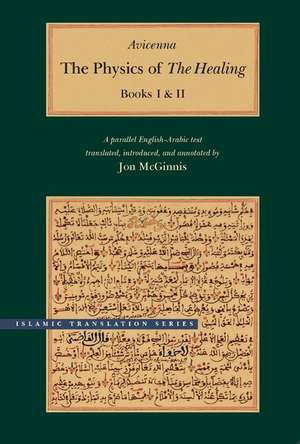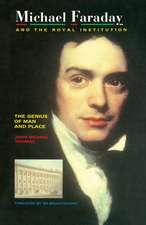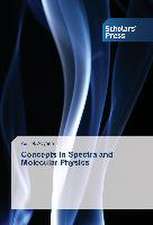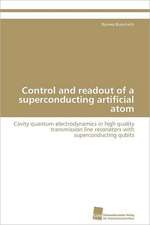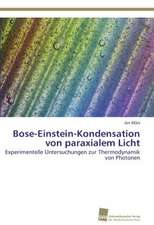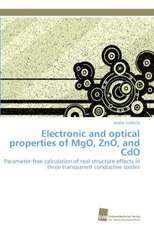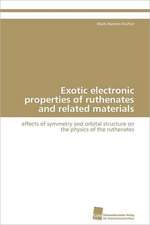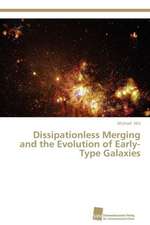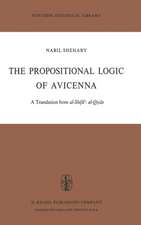The Physics of The Healing: A Parallel English-Arabic Text in Two Volumes: Brigham Young University - Islamic Translation Series
Autor Avicenna Traducere de Jon McGinnisen Limba Engleză Hardback – 9 aug 2010
Avicenna’s Physics is the very first volume that he wrote when he began his monumental encyclopedia of science and philosophy, TheHealing. Avicenna’s reasons for beginning with Physics are numerous: it offers up the principles needed to understand such special natural sciences as psychology; it sets up many of the problems that take center stage in his Metaphysics; and it provides concrete examples of many of the abstract analytical tools that he would develop later in Logic.
While Avicenna’s Physics roughly follows the thought of Aristotle’s Physics, with its emphasis on natural causes, the nature of motion, and the conditions necessary for motion, the work is hardly derivative. It represents arguably the most brilliant mind of late antiquity grappling with and rethinking the entire tradition of natural philosophy inherited from the Greeks as well as the physical thought of Muslim speculative theologians. As such, Physics is essential reading for anyone interested in understanding Avicenna’s complete philosophical system, the history of science, or the history of ideas.
While Avicenna’s Physics roughly follows the thought of Aristotle’s Physics, with its emphasis on natural causes, the nature of motion, and the conditions necessary for motion, the work is hardly derivative. It represents arguably the most brilliant mind of late antiquity grappling with and rethinking the entire tradition of natural philosophy inherited from the Greeks as well as the physical thought of Muslim speculative theologians. As such, Physics is essential reading for anyone interested in understanding Avicenna’s complete philosophical system, the history of science, or the history of ideas.
Preț: 525.61 lei
Preț vechi: 571.32 lei
-8% Nou
Puncte Express: 788
Preț estimativ în valută:
100.60€ • 104.63$ • 84.30£
100.60€ • 104.63$ • 84.30£
Carte disponibilă
Livrare economică 20 februarie-06 martie
Livrare express 06-12 februarie pentru 93.42 lei
Preluare comenzi: 021 569.72.76
Specificații
ISBN-13: 9780842527477
ISBN-10: 0842527478
Pagini: 1168
Ilustrații: 2 volumes
Dimensiuni: 152 x 229 x 86 mm
Greutate: 2.22 kg
Editura: Brigham Young University
Colecția Brigham Young University
Seria Brigham Young University - Islamic Translation Series
ISBN-10: 0842527478
Pagini: 1168
Ilustrații: 2 volumes
Dimensiuni: 152 x 229 x 86 mm
Greutate: 2.22 kg
Editura: Brigham Young University
Colecția Brigham Young University
Seria Brigham Young University - Islamic Translation Series
Notă biografică
Jon McGinnis is associate professor of classical and medieval philosophy at the University of Missouri, St. Louis.
Cuprins
Volume 1
Foreword to the Series
Foreword to the Volume
Acknowledgments
Translator’s Introduction
A Note on the Source Texts
Sigla and Conventions
First Book
On the Causes and Principles of Natural Things
Preface
Chapter One
Explaining the means by which to arrive at the science of natural things from their first principles
Chapter Two
Enumerating the principles of natural things by assertion and supposition
Chapter Three
How these principles are common
Chapter Four
Examination of what Parmenides and Melissus said regarding the principles of being
Chapter Five
On defining nature
Chapter Six
On nature’s relation to matter, form, and motion
Chapter Seven
Of certain terms derived from nature and an explanation of their status
Chapter Eight
On how the science of physics conducts investigation and what, if anything, it shares in common with the other sciences
Chapter Nine
On defining the causes that are of the greatest interest to the natural philosopher in his investigation
Chapter Ten
On defining each of the four kinds of causes
Chapter Eleven
On the interrelations of causes
Chapter Twelve
On the divisions of causal states
Chapter Thirteen
Discussion of luck and chance: The difference between them and an explanation of their true state
Chapter Fourteen
Some of the arguments of those who were in error concerning chance and luck and the refutation of their views
Chapter Fifteen
How causes enter into investigating and seeking the why-question and the answer to it
Second Book
On Motion and That Which Follows It
Chapter One
On motion
Chapter Two
The relation of motion to the categories
Chapter Three
Concerning the list of those categories alone in which motion occurs
Chapter Four
Establishing the opposition of motion and rest
Chapter Five
Beginning the account of place and reviewing the arguments of those who deny and those who affirm it
Chapter Six
The various schools of thought about place and a review of their arguments
Chapter Seven
Refuting the view of those who say that place is matter or form or any indiscriminate contacting surface or an interval
Chapter Eight
The inconsistency of those who defend the void
Chapter Nine
The essence of place and its confirmation and the refutation of the arguments of those who deny and are in error about it
Chapter Ten
Beginning the discussion about time, the disagreement of people concerning it, and the refutation of those erring about it
Chapter Eleven
Identifying and affirming the essence of time
Chapter Twelve
Explaining the instant
Chapter Thirteen
The solution to the skeptical puzzle raised about time and the completion of the discussion of things temporal, such as being in time and not in time, everlasting, eternity, [and the expressions] suddenly, right away, just before, just after, and ancient
Volume 2
Third Book
Concerning What Belongs to Natural Things Owing to Their Quantity
Chapter One
The manner of investigation peculiar to this book
Chapter Two
On succession, contiguity, following immediately, interpenetration, cohesion, continuity, intermediate, limit, being together, and being separate
Chapter Three
The state of bodies with respect to their division and a report of the various arguments on which the detractors rely
Chapter Four
Establishing the true opinion and refuting the false
Chapter Five
Solution to the puzzle of those who prattle on about the atom
Chapter Six
On the interrelation of distance, motions, and times with respect to this topic, and an explanation that no first part belongs to them
Chapter Seven
The beginning of the discussion about the finitude and infinitude of bodies and people’s opinions concerning that
Chapter Eight
On the impossibility that either a body or magnitude or number in an ordered series is infinite, and that it is impossible that there be some infinite body that is moved either in its entirety or partiality
Chapter Nine
An explanation of the way that the infinite does and does not enter into existence, and a refutation of the arguments of those who defend the existence of an actual infinite
Chapter Ten
That bodies are finite with respect to influencing and being influenced
Chapter Eleven
That nothing precedes motion and time save the being of the Creator (may He be exalted) and that neither of the two has a first [moment] of its being
Chapter Twelve
Following upon the claim that there is a point of smallness at which natural bodies are divested of their forms and that, in fact, each one of them has a certain limiting point less than which its form is not preserved; likewise, following up on the claim that no motion is the lease, slowest, or shortest
Chapter Thirteen
On the directions of bodies
Chapter Fourteen
The natural direction of rectilinear motion
Fourth Book
On the Accidents of These Natural Things and Their Interrelations, as Well as the Things That Are Necessary Concomitants of Their Interrelations
Chapter One
Of the subjects contained in this book
Chapter Two
On the numerical unity of motion
Chapter Three
On the motion that is one in genus and species
Chapter Four
Resolving the doubts raised against motion’s being one
Chapter Five
On motions that are and are not in concert
Chapter Six
On the contrariety of motions and their opposites
Chapter Seven
Of the oppositions of motion and rest
Chapter Eight
An explanation of whether one motion can really be continuous with another or whether that is impossible for them, such that there must be a state of rest between them
Chapter Nine
On the motion that is naturally prior and a catalogue of the specific differences of motions
Chapter Ten
The way in which space and other things are natural to the body
Chapter Eleven
On establishing that every body has as single natural space, and [on] the way space belongs to the body’s collective kind and to its individual instances as well as to simple and composite [bodies]
Chapter Twelve
Establishing that every natural body has a principle of motion with respect to either place or position
Chapter Thirteen
Accidental motion
Chapter Fourteen
On forced motion and the mobile’s spontaneous motion
Chapter Fifteen
The states of motive causes and the interrelations between the motive and mobile causes
Glossary of Arabic-English Terms
Subject Index
Foreword to the Series
Foreword to the Volume
Acknowledgments
Translator’s Introduction
A Note on the Source Texts
Sigla and Conventions
First Book
On the Causes and Principles of Natural Things
Preface
Chapter One
Explaining the means by which to arrive at the science of natural things from their first principles
Chapter Two
Enumerating the principles of natural things by assertion and supposition
Chapter Three
How these principles are common
Chapter Four
Examination of what Parmenides and Melissus said regarding the principles of being
Chapter Five
On defining nature
Chapter Six
On nature’s relation to matter, form, and motion
Chapter Seven
Of certain terms derived from nature and an explanation of their status
Chapter Eight
On how the science of physics conducts investigation and what, if anything, it shares in common with the other sciences
Chapter Nine
On defining the causes that are of the greatest interest to the natural philosopher in his investigation
Chapter Ten
On defining each of the four kinds of causes
Chapter Eleven
On the interrelations of causes
Chapter Twelve
On the divisions of causal states
Chapter Thirteen
Discussion of luck and chance: The difference between them and an explanation of their true state
Chapter Fourteen
Some of the arguments of those who were in error concerning chance and luck and the refutation of their views
Chapter Fifteen
How causes enter into investigating and seeking the why-question and the answer to it
Second Book
On Motion and That Which Follows It
Chapter One
On motion
Chapter Two
The relation of motion to the categories
Chapter Three
Concerning the list of those categories alone in which motion occurs
Chapter Four
Establishing the opposition of motion and rest
Chapter Five
Beginning the account of place and reviewing the arguments of those who deny and those who affirm it
Chapter Six
The various schools of thought about place and a review of their arguments
Chapter Seven
Refuting the view of those who say that place is matter or form or any indiscriminate contacting surface or an interval
Chapter Eight
The inconsistency of those who defend the void
Chapter Nine
The essence of place and its confirmation and the refutation of the arguments of those who deny and are in error about it
Chapter Ten
Beginning the discussion about time, the disagreement of people concerning it, and the refutation of those erring about it
Chapter Eleven
Identifying and affirming the essence of time
Chapter Twelve
Explaining the instant
Chapter Thirteen
The solution to the skeptical puzzle raised about time and the completion of the discussion of things temporal, such as being in time and not in time, everlasting, eternity, [and the expressions] suddenly, right away, just before, just after, and ancient
Volume 2
Third Book
Concerning What Belongs to Natural Things Owing to Their Quantity
Chapter One
The manner of investigation peculiar to this book
Chapter Two
On succession, contiguity, following immediately, interpenetration, cohesion, continuity, intermediate, limit, being together, and being separate
Chapter Three
The state of bodies with respect to their division and a report of the various arguments on which the detractors rely
Chapter Four
Establishing the true opinion and refuting the false
Chapter Five
Solution to the puzzle of those who prattle on about the atom
Chapter Six
On the interrelation of distance, motions, and times with respect to this topic, and an explanation that no first part belongs to them
Chapter Seven
The beginning of the discussion about the finitude and infinitude of bodies and people’s opinions concerning that
Chapter Eight
On the impossibility that either a body or magnitude or number in an ordered series is infinite, and that it is impossible that there be some infinite body that is moved either in its entirety or partiality
Chapter Nine
An explanation of the way that the infinite does and does not enter into existence, and a refutation of the arguments of those who defend the existence of an actual infinite
Chapter Ten
That bodies are finite with respect to influencing and being influenced
Chapter Eleven
That nothing precedes motion and time save the being of the Creator (may He be exalted) and that neither of the two has a first [moment] of its being
Chapter Twelve
Following upon the claim that there is a point of smallness at which natural bodies are divested of their forms and that, in fact, each one of them has a certain limiting point less than which its form is not preserved; likewise, following up on the claim that no motion is the lease, slowest, or shortest
Chapter Thirteen
On the directions of bodies
Chapter Fourteen
The natural direction of rectilinear motion
Fourth Book
On the Accidents of These Natural Things and Their Interrelations, as Well as the Things That Are Necessary Concomitants of Their Interrelations
Chapter One
Of the subjects contained in this book
Chapter Two
On the numerical unity of motion
Chapter Three
On the motion that is one in genus and species
Chapter Four
Resolving the doubts raised against motion’s being one
Chapter Five
On motions that are and are not in concert
Chapter Six
On the contrariety of motions and their opposites
Chapter Seven
Of the oppositions of motion and rest
Chapter Eight
An explanation of whether one motion can really be continuous with another or whether that is impossible for them, such that there must be a state of rest between them
Chapter Nine
On the motion that is naturally prior and a catalogue of the specific differences of motions
Chapter Ten
The way in which space and other things are natural to the body
Chapter Eleven
On establishing that every body has as single natural space, and [on] the way space belongs to the body’s collective kind and to its individual instances as well as to simple and composite [bodies]
Chapter Twelve
Establishing that every natural body has a principle of motion with respect to either place or position
Chapter Thirteen
Accidental motion
Chapter Fourteen
On forced motion and the mobile’s spontaneous motion
Chapter Fifteen
The states of motive causes and the interrelations between the motive and mobile causes
Glossary of Arabic-English Terms
Subject Index
Recenzii
“The Islamic Translation Series . . . has established itself as one of the most valuable resources available to scholars of Islamic theology and Arab philosophy.”
